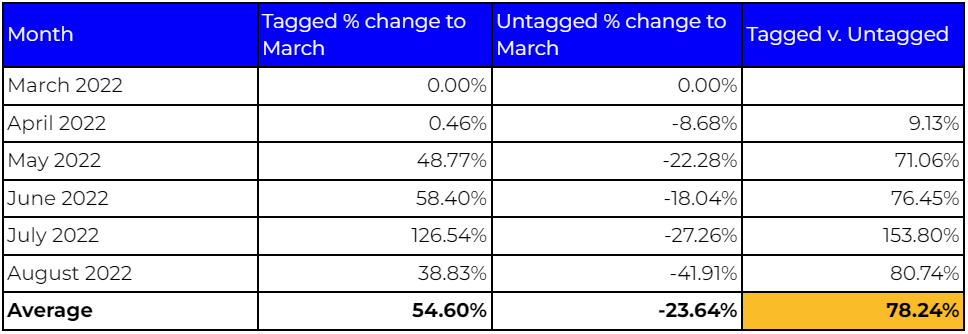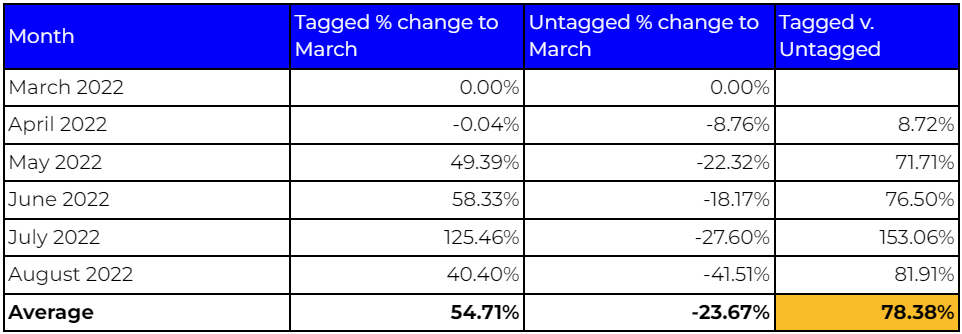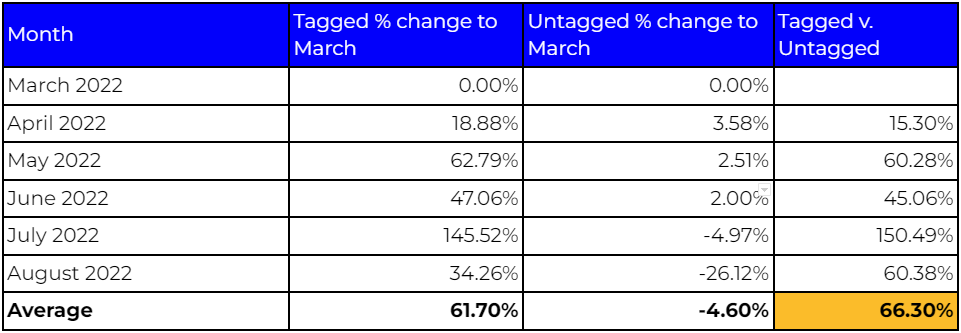Cox online fashion – 6 months follow up

Cox online fashion doubled its visitors traffic after the initial deployment of Xtag. We revisited Cox online fashion with 6 months follow up study to see the impact of the continuous effort to improve company's product meta data on Rakuten marketplace.
COMPANY OVERVIEW
Cox is a Japanese online fashion store that sells thousands of clothing items through its Rakuten marketplace store. The store offers its customers a wide selection of the latest fashion, covering women’s, men’s and children’s clothes and accessories. A joint case study was already conducted earlier this year by Cox and Lisuto, and this is a follow-up study.
THE PROBLEM
On its quest for improving performances even further, and encouraged by the results of the previous case study, Cox realized it is far from reaching its full potential. If the previous case study is correct, as it seems to be, much more products need to be tagged.
THE SOLUTION
Cox decided to continue working with Lisuto in a follow-up, and longer case study, to measure how significantly performances improve with tagged products. Once again, Lisuto tagged a multiple of Cox’s products with Xtags, to see how they improve findability in the marketplace.
METHODOLOGY
As before, the study measured and compared the performances of both tagged and untagged products, but this time across three key indicators: page views and unique user visits, which were measured in the previous study, and sales.
The case study took place shortly after the completion of the first study, and extended over a period of six months. The first test month, March 2022, served as a benchmark, after the initial 3 months of the Xtag usage. Once a benchmark has been established, the following months’ results were compared to March’s results.
Lisuto collected data only on the top 1,000 most viewed tagged products during the test period, and the top 1,000 most viewed untagged products, serving as a control group.
THE RESULTS
The results of this Cox online fashion 6 months follow up case study significantly support the claim that tagging products with Xtags improves their overall performance, compared to untagged products.
Page views
The page views results leave no doubt as to how tagging impacts performances. In April untagged products dropped by 8%, while tagged products remained at the same level, even registering a slight uptick compared to March. This was a sign for things to come.
Over the next few months we can see a very significant difference between tagged and untagged products. In May, tagged products surged to an almost 50% increase compared to March, while untagged products dropped by more than 22%. The gap between the two types of products got bigger in June, when tagged products improved to a 58% increase in page views, compared to an 18% decrease registered by untagged products.
July has been extraordinary. During this month, while untagged products again increased their decline to 27% below March’s numbers, tagged products exploded with more than 126% increase in page views compared to March. In August, the last month of the test period, while tagged products maintained a 39% increase compared to March, untagged products continued to drop by almost 42%.
On average, throughout the test period tagged products outperformed untagged products by 78.24%.
Unique Users 
Not surprisingly, the results for unique user visits almost mirror those of page views. April is relatively calm, tagged products remaining almost the same as in March, and untagged products registering an 8% decline.
In May, tagged products are gaining steam, with unique user visits increasing by almost 50% compared to March. In the same month, untagged products’ unique user visits dropped by more than 22%. This trend continued in June, with untagged products registering another increase to 58%, and untagged products still down more than 18% compared to March.
In July, tagged products enjoyed a whopping 125% increase in unique user visits compared to March, and at the same time untagged products dropped by 27%. Eventually, in August, untagged products suffered their biggest drop, declining by 41.5% in unique user visits compared to March, while tagged products enjoyed more than 40% boost.
Overall, tagged products did on average 78.38% better than untagged products in unique user visits.
Sales
The results for the sales indicator keep the same trend - tagged products perform much better than untagged products. In April, untagged products’ sales slightly increased compared to the month before, but tagged products saw an almost 19% increase in sales. The gap between the two types became even more significant in May, when once again untagged products saw only a slight rise in sales compared to the base month, and tagged products surged by almost 63%. June was more of the same, with tagged products improving by 47% and untagged products still barely moving compared to March.
Then came July. While untagged products finally began to decline in sales, tagged products experienced a 145.5% boost in sales compared to March’s numbers. In August, again, the differences between tagged and untagged products were obvious, with tagged products enjoying a 34% increase in sales compared to March, while untagged products spiraled down by 26%.
On average, tagged products outperformed untagged products by 66.3% throughout the test period.
CONCLUSION
This case study has been conducted in order to examine how significantly tagging product listings with navigational tags improves its performance in the marketplace. The results show unequivocally that tagged products continually and significantly outperform untagged products, across the three KPI’s examined: page views, unique user visits and sales. However the important thing we discover in Cox online fashion 6 months follow up study is that the continuous investment into data tagging and product meta data continues to contribute significantly beyond the initial post deployment improvement.
These results are in line with the results of numerous other case studies conducted by Lisuto to examine the impact of tagging. As the case studies of Eqrio, Chuko, Niche, and more show, tagging products with Xtags instantly impacts their performance.




